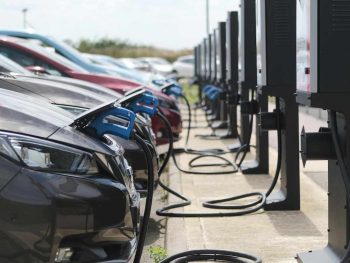Major eco and financial benefits of vehicle-to-grid tech revealed
Vehicle-to-grid (V2G) technology could help with UK carbon reduction goals while also helping to save costs for both power system operators and fleet operators.

V2G can help deliver overall power system cost savings of up to £885m per year according to the e4Future project
In fact, a new white paper says the two-way charging technology can help deliver overall power system cost savings of up to £885m per year while also saving costs for fleets and helping to achieve long-term goals in relation to climate change.
The research has been set out in a new white paper from Nissan. E.ON Drive and Imperial College London, all of which are partners in a commercial project that explores V2G and its potential benefits.
The e4Future project – one of a number of V2G projects being run with the help of the Department for Business, Energy and Industrial Strategy (BEIS) and the Office for Zero Emission Vehicles (OZEV – formerly OLEV) – aims to demonstrate how electric vans and cars can support the UK grid and provide a profitable and sustainable solution for business fleets.
The work – which saw fleets invited to sign up to trials of V2G in August 2020 – also finds that V2G could bring electricity system operation cost savings of up to £12,000 per annum per electric vehicle along with CO2 reduction of approximately 60 tonnes per annum per EV. On a fleet level, annual fleet V2G charging benefits could range between £700-£1,250 per vehicle.
The white paper also offers supporting recommendations and calls for the introduction of incentives to accelerate widespread adoption of vehicle-to-grid (V2G) charging systems, enabling potential benefits to be unlocked.
In addition, it addresses some of the challenges that will be faced in the early days of V2G, particularly around creating a reliable business case in the context of evolving energy markets and regulation.
Professor Goran Strbac, chair in electrical energy systems at Imperial College London, said: “Our research has demonstrated that V2G can provide very substantial economic benefits to the power system as well as reduce carbon emissions. This revealed that the additional flexibility provided by V2G fleets can considerably improve system efficiency and reduce investment in new low-carbon generation, while meeting national decarbonisation targets.”
For more information about how fleets can get still get involved with the V2G trials, visit www.eonenergy.com/v2g.

